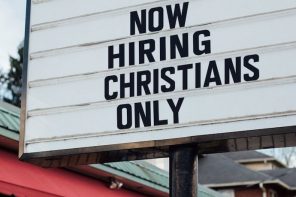For the last several months there has been a flurry of discussion—mostly online, of course—about the impossibility of a literal Adam & Eve (see, e.g., here and here and here). This ruling-out has been accomplished recently by the Human Genome Project, which indicates that anatomically modern humans emerged from primate ancestors about 100,000 years ago, from a population of something like 10,000. In short, science has confirmed what many of us already knew: there was not a literal first couple. So what else can we learn from this story?
Plenty, it turns out. Peter Enns, a biblical scholar who blogs at Patheos, has been following the discussion with some care. Lately he has done us all a great favor: written a series of posts pointing out recurring mistakes made by many of those doing the discussing. Many of these mistakes are rhetorically effective but collapse upon even modest inspection.
But not all of them.
On Friday, he listed one held mostly by the pro-science crowd: “Evidence for and against evolution is open to all and can be assessed by anyone.”
Enns declares that this is not so. “The years of training and experience required of those who work in fields that touch on evolution rules out of bounds the views of those who lack such training,” he writes.
This is true but it misses the point. The open-access-to-science cliché, usually trundled out by those who wish to contrast the transparency of science with the supposed obfuscation of religion, carries some truth.
Science actually is transparent in a way that religion is not. That’s because, in science land, there is nothing but to follow the evidence. It’s out on the table, after all, able and willing to be poked and prodded and analyzed and figured out and held up and turned around and looked at from new angles. Also, what counts as evidence in science is pretty well-defined. And if you do become an evolution expert, you actually will see that 99% of all scientists back evolution for a reason: the evidence demands it.
This is the great generosity of science, and its great strength: It is actually all right there, ready to be seen and understood. It is relievedly explicit. It takes effort, sure, just as Enns suggests; it’s not easy to become a professional research biologist. But the reason biologists agree on evolution is because it’s a relatively simple matter to be objective about fossils and genes. Unlike the objects of religion—the divine and humanity’s relation to it—the objects of science give themselves up for abstraction and analysis without a fight.
Therefore Richard Dawkins (for example) is right when he says, as he has on many occasions, that the evidence for evolution is there to be inspected by anyone. It is sitting out there on the table, waiting patiently for most of humanity to catch up to it, waiting to tell us it’s time to bid the historical Adam & Eve a final, if fond, farewell.




